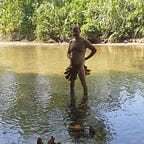Sasi’s Grandmother
A story you’ll forget
We gathered in the evening after a bioconstruction workshop, and Sasi, my indigenous Kichwa friend who lives in a community in the Amazon forest, told us the story of her grandparents founding her community 70 years ago…
They were from around Achidona, a city in the east of Ecuador, at the doorstep of the jungle. Her grandma didn’t like it there, because it was full of white colonizers (in Sasi’s words “gente blanca, los colonos”) who were abusing and killing indigenous people, raping indigenous women, Sasi’s great grandmother being a child born from such a rape. These weren’t anecdotal occurrences, but a widespread trend. Sasi’s grandma was fearing for her safety and kept asking her husband to move away, away from the city, somewhere deep in the jungle where there were no white people.
Eventually, they, along with a group of their indigenous friends started to search for a place deep in the jungle, where they could create a new community away from “los colonos”. Resistance was out of the question, as they would be quickly overpowered by far.
They found a place they liked, settled there with the rest of the families, and called the place Campo Cocha. Settling there wasn’t easy, they got attacked by a tribe of Waorani who lived in the area, and blood was spilled. After a period of hostilities, they made peace, became friends, and started a peaceful coexistence. Although today they don’t get in contact much anymore, they still have friendly relations, visit each other from time to time, sometimes marry between them and have mixed children, and resolve their territorial disputes with words instead of weapons.
For a short period, Sasi’s grandmother lived a peaceful life in the house near the river. Until los colonos started having rides on the river and noticing their community. Fearing for their safety, they moved their houses away from the river, but after a short time a road was built there, so they got trapped in between two routes used by los colonos. Sasi’s grandmother had no choice but to accept their presence.
This story happened 70 years ago, a century after you think the white “colonization” ended. Your grandmother was probably a young woman then, just like the indigenous ones who got kidnapped and raped by your compatriots. Maybe your grandpa was one of “los colonos” who raped.
Campo Cocha has grown into a community of more than 400 people, all of them descendants of the original families who founded it. They are being constantly attacked by consumerism, big agrarian and mining companies, which is making them poor, destroying their traditions, and making them lose their land, the chain ending in your plate and technology.
Fortunately, there are people like Sasi, who refused a scholarship in France because she wants to stay in her community and fight for it, help it end the exploitation, and get back its traditions and resilience.
When Sasi was telling this story, we were in a gathering with Kichwa friends from the Andes (“Kichwa de la sierra”), and this was just one of the stories she told, so I didn’t want to intrude. But I wanted to tell her so badly, “You shouldn’t call these people ‘los colonos’. They are not colonizers, but occupiers and criminals, who were part of the occupation which is still ongoing today in a legalized form.”
Today, Ecuador is somewhat safer, so “los ocupadores” aren’t raping indigenous women so much, but you’re still raping the indigenous people by other means:
Btw, in Kichwa, Sasi means Saturday. This trivia doesn’t have any importance, nor is relevant for this story, I just wanted to give you something you’ll remember after you protect yourself by forgetting this story tomorrow.
Ashka pagrachu Sasi for sharing the story of her community.
